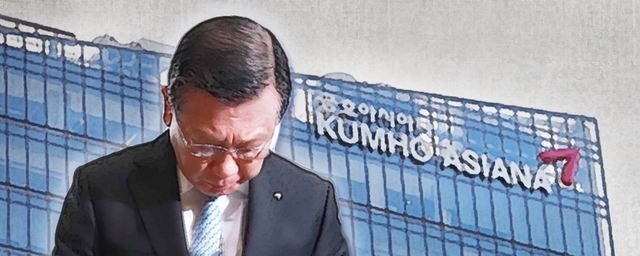Posted on : Apr.16,2019 18:01 KST
Modified on : Apr.16,2019 18:03 KST
Facing a liquidity crisis, the Kumho Asiana Group decided to sell off Asiana Airlines, its core subsidiary, on Apr. 15. The sale offers the group its only way out of the crisis.
On Apr. 10, the Kumho Asiana Group submitted a recovery plan to its creditors, which include the Korea Development Bank (KDB), in which it would receive 500 billion won (US$440.33 million) of financing on the condition that it sold off subsidiaries of Asiana Airlines and offered the stake in Kumho Bus Lines held by the family of former group Chairman Park Sam-koo as collateral, but the creditors rejected this plan.
The proposed plan wasn’t enough to help the group regain the trust of the market. Even Choi Jong-ku, chair of the Financial Services Commission (FSC), voiced his strong distrust in Park, who he said was playing for time in a bid to cling to control of the group in one way or another. In the end, it was inevitable that Asiana Airlines would be sold off, and the creditors and financial regulators deserve credit for having stuck to their guns and teased out a recovery plan that holds the majority stockholder accountable.
What’s most praiseworthy is that the resulting plan is focused on bailing out the company and not the former chairman’s family. If Park and his family were to retain control of Asiana, the airline might deteriorate beyond the hope of recovery.
Considering that Asiana Airlines accounts for more than 60% of revenue at the Kumho Asiana Group, the sale of the airline will push the group from 25th place among South Korea’s chaebols to below 60th. The precipitous fall of a group that was once the country’s seventh largest was brought on by Park himself.
In 2006 and 2008, Park leveraged massive loans to acquire Daewoo Engineering and Construction and Daehan Shipping. As a result, major group affiliates, including Kumho Industrial and Kumho Tire, had to undergo debt restructuring, and the entire group faced a liquidity crisis. Along the way, Park had a falling out with his younger brother, Kumho Petrochemical Chairman Park Chan-koo, and Park Sam-koo had to step down from his chairmanship in 2009.
After returning to his position the next year, Park took steps to acquire Kumho Industrial and Kumho Tire, under the banner of “rebuilding the group.” The funding for this project came from Asiana Airlines and rapidly hollowed out its finances. Despite having nearly ruined the group through reckless business expansion just a few years before, Park had failed to learn anything from that experience.
The situation at the Kumho Asiana Group aptly demonstrates how severe of a crisis a company can face when the owner’s hubris is left unchecked. This serves as a stark reminder of the damage inflicted by a backward corporate control structure in which the board of directors is powerless to rein in the owner’s faulty judgment and poor decisions. We can only hope that the owners of other chaebols will learn a lesson from all this. It’s time to rectify the imperial style of management, which exacerbates owner risk, before it’s too late.
Please direct comments or questions to [english@hani.co.kr]






